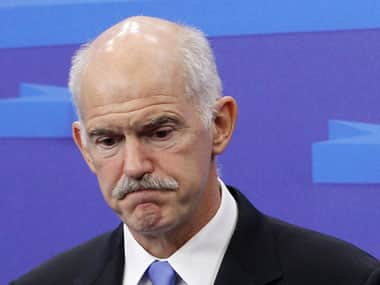Eurozone ministers on Monday delayed the $17-billion bailout to Greece to pressurise Athens to implement a controversial austerity programme , which is already facing the heat in the home country. The controversial programme includes higher taxes and more spending cuts to curb the fiscal deficit. However, the European Union on Tuesday agreed to spread a massive €700 billion permanent financial safety net to bailout euro zone nations facing liquidity crisis and thereby stave-off future sovereign debt crunch endangering their stability. The new rescue fund— European Stability Mechanism (ESM) — will replace the present €440 billion temporary financial shield— European Financial Stability Fund (EFSF)— when it expires in mid-2013. [caption id=“attachment_28677” align=“alignleft” width=“380” caption=“Greece’s Prime Minister Papandreou. Reuters”]
 [/caption] It was set up a year ago to prevent the debt crisis in Greece from spreading to other debt-ridden countries in the euro zone such as Ireland and Portugal. The EU finance ministers finalised the terms of the proposed rescue fund as Greece struggled to avert a bankruptcy a year after receiving a €100 billion bailout from the EU and the International Monetary Fund in May, last year. Even though the EFSF has €440 billion at its disposal, its actual lending capacity was around €250 billion because the rest was needed to be strong enough to keep its borrowing cost low. Therefore, the finance ministers decided to raise its effective lending capacity to €440 billion. So far, Ireland and Portugal were rescued from bankruptcy with the support of funds from the EFSF. The proposed new rescue fund will be comprised of €620 million in credit guarantees and €80 billion in cash from the euro zone member nations. The cash payment will be made in five equal tranches during the period between 2013 and 2017, the statement said. Greece urgently needs the latest tranche to avoid defaulting on debt repayments due next month. It will also ensure that Greece will remain solvent until September. The ministers also acknowledged Greece’s needs for a second multi-billion rescue package because it will not be in a position to raise funds from capital markets at least until early next year. They agreed that the proposed bailout will include private creditors for the first time on a “voluntary basis”. Juncker said after Sunday’s meeting that Greece will get the next tranche as well as a second rescue package from the EU if the Greek government takes the appropriate decision and implement them. The heads of state and government of the European Union are expected to agree on the key aspects of a second bailout ranging between 90 billion euros and 120 billion euros when they hold a summit in Brussels on Thursday and Friday. PTI
[/caption] It was set up a year ago to prevent the debt crisis in Greece from spreading to other debt-ridden countries in the euro zone such as Ireland and Portugal. The EU finance ministers finalised the terms of the proposed rescue fund as Greece struggled to avert a bankruptcy a year after receiving a €100 billion bailout from the EU and the International Monetary Fund in May, last year. Even though the EFSF has €440 billion at its disposal, its actual lending capacity was around €250 billion because the rest was needed to be strong enough to keep its borrowing cost low. Therefore, the finance ministers decided to raise its effective lending capacity to €440 billion. So far, Ireland and Portugal were rescued from bankruptcy with the support of funds from the EFSF. The proposed new rescue fund will be comprised of €620 million in credit guarantees and €80 billion in cash from the euro zone member nations. The cash payment will be made in five equal tranches during the period between 2013 and 2017, the statement said. Greece urgently needs the latest tranche to avoid defaulting on debt repayments due next month. It will also ensure that Greece will remain solvent until September. The ministers also acknowledged Greece’s needs for a second multi-billion rescue package because it will not be in a position to raise funds from capital markets at least until early next year. They agreed that the proposed bailout will include private creditors for the first time on a “voluntary basis”. Juncker said after Sunday’s meeting that Greece will get the next tranche as well as a second rescue package from the EU if the Greek government takes the appropriate decision and implement them. The heads of state and government of the European Union are expected to agree on the key aspects of a second bailout ranging between 90 billion euros and 120 billion euros when they hold a summit in Brussels on Thursday and Friday. PTI
Plan B: 700 bn euro bailout for debt-ridden nations
FP Archives
• April 28, 2021, 15:38:39 IST
Eurozone ministers on Monday delayed the $17-billion bailout to Greece to pressurise Athens to implement a controversial austerity programme , which is already facing the heat in the home country. The controversial programme includes higher taxes and more spending cuts to curb the fiscal deficit. However, the European Union on Tuesday agreed to spread a massive €700 billion permanent financial safety net to bailout euro zone nations facing liquidity crisis and thereby stave-off future sovereign debt crunch endangering their stability.
Advertisement
)